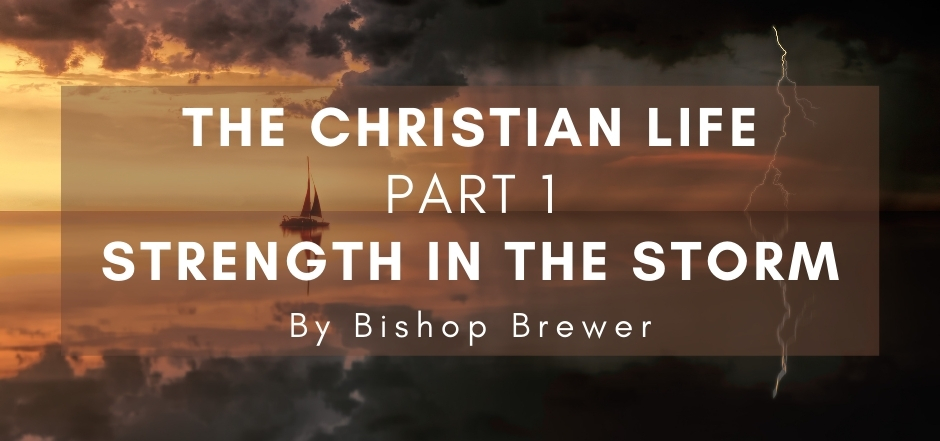The Christian Life – Part 1: Strength in the Storm
We live in a crazy world right now—not only what’s happening in the United States, but across the globe as well. And when we read in Scripture about wars, famine, pestilence and earthquakes (see Luke 21:5-19) the stories really could sound like front-page headlines. It’s almost like a checklist, where you could say, “Yes, that’s going on,” “Yes, that’s going on” and “That is, too.”
A Confusing Canticle
Quite frankly, most people respond to what they see on the news with fear. And in that fear, the reactions are either to watch the news as much as possible so that there’s some sort of mastery, or to turn it off and not pay attention at all.
So how odd it is, amidst this tumult, to hear the words of the canticle from Isaiah, “Surely God is my salvation; I will trust, and will not be afraid. For the Lord God is my strength and my might; he has become my salvation” (Isa. 12:2).
Now that works, except if you’re really listening to the Scriptures, when Jesus begins to tell His stories to His own disciples. He says things like “You will be betrayed even by parents and brothers, by relatives and friends, and they will put some of you to death. You will be hated by all because of my name” (Luke 21:16-17). That doesn’t sound a lot like deliverance, does it?
So what is Jesus talking about? What does it mean to be protected even in difficulty? It doesn’t necessarily mean you’re saved out of bad circumstances, although it does happen. Churches are always filled with stories about how at the last minute, God showed up and deliverance came: “I never expected it, and I prayed for it, but I wasn’t sure it was going to happen.”
A Present-Day Reality
I’ve got stories like that in my life, too, for which I am profoundly grateful. But I also hear the stories, especially, of persecuted Christians. Our church is a global one. So that means, we have, in our own communion, sisters and brothers in Jesus, in other parts of the world especially, who are suffering for their faith. These are believers who have experienced the confiscation of their property, who have been marginalized and mistreated. They’ve endured prejudicial speech and actions, and some have even lost their lives.
This is not just “out there somewhere.” This affects people we know, people with whom we share a common faith. And my experience is, the more I get involved in this global Anglican Communion, the more, when I hear these Scriptures, I see faces. I think of families I know and people who, firsthand, have experienced the kind of marginalization, derision or loss of financial income. They had to flee the country because they were immigrants, or their property was confiscated because they were Christians, and some have lost relatives to martyrdom. This is a present-day reality.
So following Christ doesn’t always mean we get to escape difficulty. I like to say that confirmation comes with three things: a prayer of protection of your head; the sign of the cross on your forehead in oil, which is the Holy Spirit; and a slap. The slap serves as a reminder that the commitment to serve Jesus means you could end up in difficulty. Not because you’re a cranky person, not because sometimes bad things happen, because they do—that’s a part of what it means to live in a broken, fallen world.
But sometimes, genuine opposition occurs because of your commitment to Jesus Christ. That’s what the slap means. It’s a commitment being made alongside confirmation, a commitment to serve Jesus even when it gets difficult.
A Future Deliverance
Confirmation is not for whiners. And neither is the Christian life. In fact, the Scriptures lay out a choice. On the one hand, a commitment to follow Jesus and the extraordinary promises that accompany it: God working in us endurance, his being with us every step of the way, the companionship of his presence and the future deliverance that results in a new heaven and a new earth. It results in the promises in Isaiah, where the wolf shall live with the lamb, the lion shall eat straw like the ox (see Isa. 11:6-7) and men shall not learn war anymore (see Isa. 2:4). That’s heaven, and it’s on its way.
My hope in Christ is that when my body dies, I will stand in the presence of the Lord, and I will be in that place where there is no pain, where there is no grief, where God wipes away every tear in every eye. And if it was sickness that brought me to the shadow of death, I will say to sickness, “No you don’t. You can’t come with me,” and I will be taken into the presence of God. Sickness and death will be no more.
That’s the future, but it’s not now. So how do we live now? We’ll talk about that in next month’s post.
How has your commitment to Christ brought opposition? Share this blog and your response on Twitter. Please include my username, @revgregbrewer.
(This post is an adaptation of Bishop Brewer’s sermon on Nov. 13, 2016, at Church of the Messiah in Winter Garden, Florida.)
Unless otherwise noted, Scripture quotations are from the New Revised Standard Version Bible, copyright © 1989 the Division of Christian Education of the National Council of the Churches of Christ in the United States of America. Used by permission. All rights reserved.

